How to Power Devices Anywhere with Flexible LightSaver Solar Charging Solutions
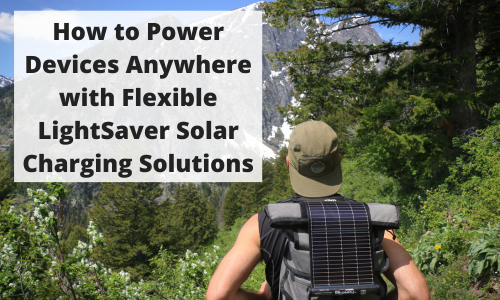
Originally published 3-23-2023
With our increasing reliance on smartphones, cameras, and other portable electronics, staying powered away from shore power is more crucial than ever.
Running out of juice can quickly turn a fun trip into a stressful, hazardous situation. What if you could be fully charged and connected no matter how far off the grid your travels took you?
In a time where seemingly everything requires electricity, how do you stay connected when you’re away?
In today’s post, we will cover:
- Why portable power is necessary
- When portable solar makes sense
- Available solutions on the market and their drawbacks
- How pairing off-the-shelf systems can reduce efficiency
- Why the LightSaver line is a simple and effective solution for portable power needs.
Take this blog post with you!
Why is portable power necessary?
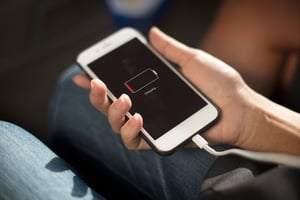
For many, portable power is a means of staying connected, taking photos, sending texts, or making phone calls away from an outlet.
The backpacker, thru-hiker, adventure photographer, and ham radio operator have different needs.
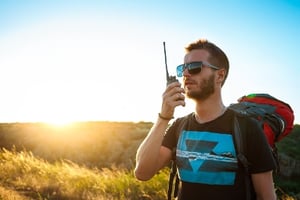
For them, power is crucial, allowing them to document their travels, keep in touch with loved ones, make contacts from remote regions, or call for help should an emergency arise while on the trail or in a remote location.
Portable power solutions are practical almost anywhere, including on road trips, at the airport, outdoors, and other situations.
When do portable solar solutions make sense?
When your power needs are beyond short-term (topping off a cell phone here, charging a small action camera there) and span many days, a solar solution makes a lot of sense.
For example, when a professional filmmaker is on location for an extended time, access to grid power isn't possible or when a hiker embarks on a months-long journey and is completely disconnected from conventional power sources.
Potential solutions to this portable power problem
1. Bring more batteries.
-
- While doable, this leads to increased pack weight, and in an emergency, what felt like enough power for the trip might fall short.
2. Solar charge your device directly.
-
- This can work but requires leaving your device plugged in and in the sun.
3. Pair a portable solar panel with an off-the-shelf battery.
-
- These systems can "work" but often throw away a lot of power because they are designed to do different things and rarely work together efficiently.
Is there a better way to stay powered during your next family vacation, an all-important backpacking trip, or a thru-hike?
There is.
To make the solar charging process more accessible, we developed LightSaver Portable Solar Chargers.
This line of chargers features simple operation, integrated batteries and lightweight construction.
There are two options designed to meet power needs from small to large.
The LightSaver Portable Solar Charger is an ultra-light integrated solution ideal for someone needing minimal, lightweight, portable power that can fit in their pocket.
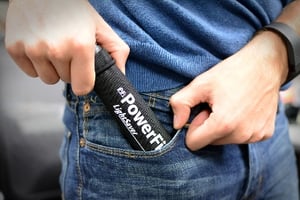
The LightSaver Max Portable Solar Charger is a more sizable solution capable of powering multiple higher-draw devices simultaneously.
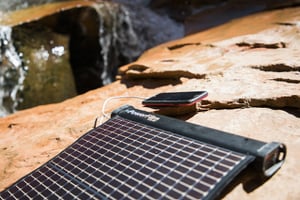
Photo Credit: Alexandra Gunnoe
Which LightSaver Is Right For You?
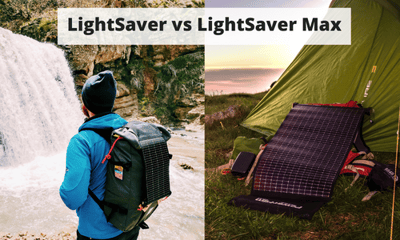
Photo Credit: Robby Bowles & Andrea Barberis
How do you know you're getting the right LightSaver Portable Solar Charger?
We’ve simplified the process.
Below are descriptions of each option and example use cases to help you decide which best suits your power needs.
The LightSaver Portable Solar Charger
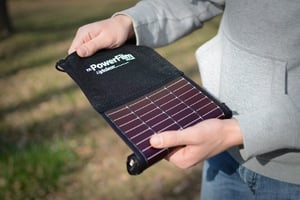
The LightSaver was designed as a simple, ultra-light integrated solution, making solar technology accessible to everyone.
The LightSaver is an all-in-one solar solution with a roll-out thin-film solar panel and an integrated battery for storing the solar energy it captures.

Photo Credit: Wild We Wander
The LightSaver Portable Solar Charger is small enough to fit in your pocket and is powerful enough to charge USB devices.
Specifications
- Battery: 3200mAh (Lithium-ion)
- Under the 100Wh TSA limit
- Weight: 4.9oz / 138.9g
- Power In: Solar / USB
- Power Out: 1 USB (5V, 1A Max current, Typical current 0.25A-0.75A depending on device)
- Solar Charge: 6-8 hours full sun
- Wall Charge: 3 hours
- Dimensions:
- Rolled: 7.8 x 1.5 (in) / 198.1 x 38.1 (mm)
- Unrolled: 7.8 x 18.5 (in) / 198.1 x 469.9 (mm)
Visit the product webpage to learn more.
You don’t need to leave your device connected directly to the panel, charging only when the sun shines. The LightSaver quickly deploys on a backpack or tent and starts charging its internal battery.
Watch this video of adventure photographer Max Seigal discussing the role portable power plays in his adventures and how the LightSaver helped him stay powered up on a trip to Nepal.
We understand that you can’t always charge from solar. The LightSaver is a powerful solar charger and battery bank that can charge using its micro-USB input.
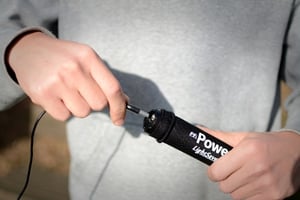
The LightSaver Portable Solar Charger Is Perfect For:
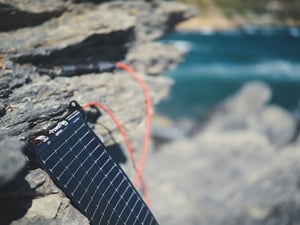
Photo Credit: Further Stories
An active cell phone user who needs portable power to keep conducting business, sending emails, answering phone calls, playing games or streaming media.
With the LightSaver, you don't need extra cables or an external battery. You unroll the panel, and it starts charging.
Whether heading out on a family vacation or a thru-hike of the Appalachian trail, pick up a LightSaver Portable Solar Charger for your next trip and stay charged with the market's lightest and most portable solar charger.
Pick up a LightSaver Portable Solar Charger Today
The LightSaver Max Portable Solar Charger
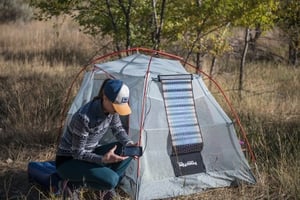
Photo Credit: Max Seigal
If you need more power and want to charge multiple devices, you’ll love the LightSaver Max Portable Solar Charger.
The Max is a serious-sized solar charger that provides power for trekking or other outdoor activities. It can power cell phones, tablets, ham radios, and other power-hungry USB/12V electronics.
The LightSaver Max includes an integrated battery and flexible solar panel that rolls around the battery to stow compactly in your backpack or bag and deploy quickly for rapid solar charging.
Specifications
- Battery: 18000mAh (60Wh) (Lithium-ion)
- Under the 100Wh TSA limit
- Weight: 1.5lb / 0.7kg
- Power In: Solar / USB-C / 12V
- 12V input barrel size: 1.30 mm ID x 3.50 mm OD
- Power Out: Dual USB (2.5A, 5V), 12V (5A Peak)
- 12V output barrel size: 2.1 mm ID x 5.5 mm OD
- Solar Charge: 8-10 hours full sun (3-5 hours with an additional 30W of solar).
- Wall Charge: 3-4 hours (12V), 6-7 hours (USB-C), 8-10 hours (USB)
- Dimensions:
- Rolled: 13.5 x 2.5 (in) / 342.9 x 63.5 (mm)
- Unrolled: 13.5 x 34.5 (in) / 342.9 x 876.3 (mm)
Visit the product webpage to learn more.
Additionally, using the 12V Input Charging Cable (included with the LightSaver Max) and a 12V Female Car Charger Adapter (Included with Rollable/Foldable Solar Panels), you can pair the LightSaver Max with PowerFilm 15.4V panels (Rollable and Foldable) via the 12V input and charge the Max even faster. With an additional 30W of solar input, you can charge the LightSaver Max in 3-5 hours of full sun.
While the LightSaver Max accepts up to 30W of additional charging, you can pair up to 60W of auxiliary solar to account for lower-quality solar conditions and ensure you put as much power as possible into the Max.
LightSaver Max Compatible Auxilary PowerFilm Panels
-
Foldable Solar Panels
-
Rollable Solar Panels
In this video, Julian White (OH8STN) describes the features that make the LightSaver Max ideal for powering ham radios and other electronics.
Watch this video of ham radio operator Julian White describing how he powers his Icom IC705 with the LightSaver Max.
The LightSaver Max is Perfect Solar For:


Photo Credit: (Left) Adam Stoller, (Right) Francois Leger-Savard
Someone away from shore power for an extended period who wants to charge a phone, tablet, DSLR camera, ham radio and other devices simultaneously.
The Max is ideal for powering your family's next camping trip, a videographer’s camera while on a remote shoot, a mobile businessperson’s various devices, and anyone needing professional and robust portable power.
Increasingly, more of the devices we use daily require power. To stay connected on the road, in the airport, on a hike or on top of a mountain, pick up the best LightSaver Portable Solar Charger for your needs today!
Have a question? Contact us. We look forward to assisting you.
Take this blog post with you!